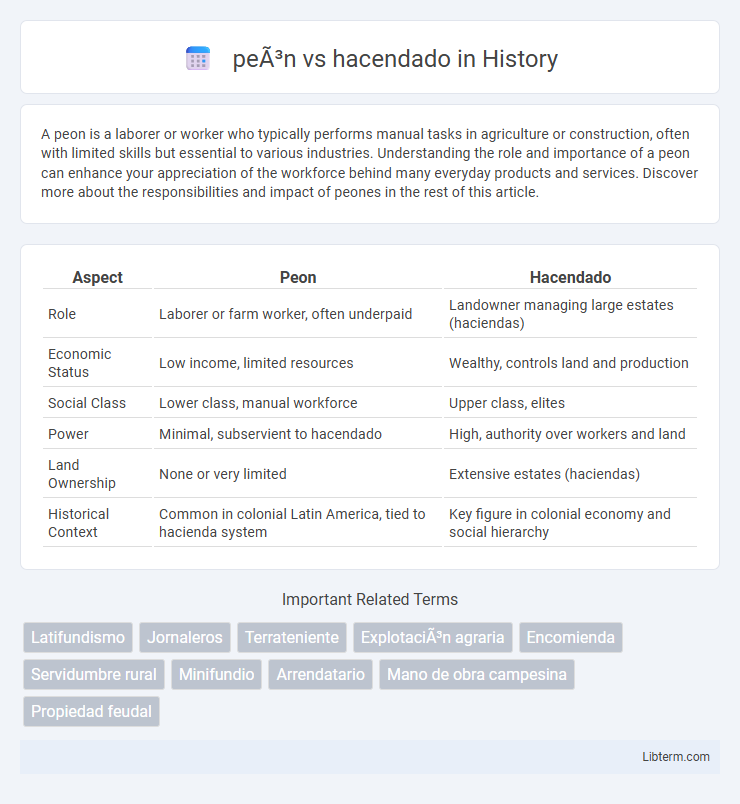A peon is a laborer or worker who typically performs manual tasks in agriculture or construction, often with limited skills but essential to various industries. Understanding the role and importance of a peon can enhance your appreciation of the workforce behind many everyday products and services. Discover more about the responsibilities and impact of peones in the rest of this article.
Table of Comparison
| Aspect | Peon | Hacendado |
|---|---|---|
| Role | Laborer or farm worker, often underpaid | Landowner managing large estates (haciendas) |
| Economic Status | Low income, limited resources | Wealthy, controls land and production |
| Social Class | Lower class, manual workforce | Upper class, elites |
| Power | Minimal, subservient to hacendado | High, authority over workers and land |
| Land Ownership | None or very limited | Extensive estates (haciendas) |
| Historical Context | Common in colonial Latin America, tied to hacienda system | Key figure in colonial economy and social hierarchy |
Definición de Peón y Hacendado
A peon is a rural laborer who typically works on agricultural estates, performing manual tasks such as planting, harvesting, and tending to crops under the supervision of landowners. A hacendado is a landowner who controls large agricultural estates called haciendas, managing production, labor, and resources. The relationship between peon and hacendado reflects a socio-economic hierarchy intrinsic to agrarian economies, often characterized by power imbalances and dependency.
Orígenes Históricos de la Relación Peón-Hacendado
The relacion peon-hacendado se origina en el sistema de encomiendas y haciendas impuesto durante la colonizacion espanola en America, donde los peones trabajaban en las tierras del hacendado a cambio de un salario minimo o credito en tienda, perpetuando una estructura de dependencia economica y social. Este vinculo establece una dinamica de poder desigual arraigada en la propiedad de la tierra y la explotacion laboral, consolidandose durante los siglos XVI al XIX en las grandes haciendas rurales. La transicion hacia sistemas modernos de trabajo rural refleja luchas historicas por derechos laborales y autonomia campesina frente a la hegemonia hacendaticia.
Condiciones Laborales del Peón
Las condiciones laborales del peon en el contexto del hacendado suelen caracterizarse por jornadas extensas de trabajo fisico intenso y remuneraciones bajas, reflejando una relacion de dependencia economica y social. La falta de acceso a derechos laborales basicos y la precariedad en la vivienda y alimentacion agravan su situacion, evidenciando una clara desigualdad frente al hacendado que detenta el control sobre los recursos y tierras. Esta dinamica perpetua un sistema donde el peon enfrenta explotacion y limitadas posibilidades de mejora social y economica.
Privilegios y Poder del Hacendado
The hacendado wielded extensive privileges and power derived from landownership and economic control over peones, who were often bound by debt and labor obligations. This asymmetrical social hierarchy enabled the hacendado to impose strict working conditions and maintain dominance through legal and extralegal means. The concentration of political influence and resources in hacendados perpetuated cycles of inequality and limited peones' social mobility.
Dependencia Económica y Social
The peon typically experiences dependencia economica y social due to limited wages and lack of land ownership, relying heavily on the hacendado for employment and basic needs. The hacendado maintains economic power by controlling resources, labor contracts, and access to credit, reinforcing social hierarchies. This dynamic perpetuates a cycle of dependence, restricting the peon's opportunities for economic mobility and social autonomy.
Impacto en la Estructura Agraria
La relacion entre peon y hacendado configura la estructura agraria al consolidar sistemas de trabajo dependientes que mantienen la concentracion de tierras en pocas manos. Este modelo perpetua la desigualdad agraria, limitando el acceso del campesinado a la propiedad y a recursos productivos. La tension social generada por estas condiciones impulsa procesos de reforma agraria y movilizaciones campesinas.
Conflictos y Luchas Sociales
The conflicts between peones and hacendados in Latin America were marked by struggles over land rights, labor exploitation, and social inequity. Peones often faced harsh working conditions, low wages, and lack of legal protections, leading to uprisings and organized labor movements. These social struggles highlighted the deep class divisions and fueled demands for agrarian reform and labor rights throughout the 19th and 20th centuries.
Cambios Legislativos y Derechos Laborales
Cambios legislativos recientes han fortalecido los derechos laborales del peon rural, incluyendo mejores condiciones de trabajo, acceso a seguridad social y regulacion de jornadas laborales. El hacendado, como empleador, debe cumplir con normativas que garantizan el pago justo, proteccion contra despidos indebidos y protocolos de seguridad en el campo. Estas reformas buscan equilibrar la relacion laboral para promover justicia social y productividad sostenible en el sector agropecuario.
Influencia Cultural y Representaciones en la Sociedad
The peon represents the working class in rural Latin America, embodying resilience and connection to indigenous traditions, while the hacendado symbolizes land ownership, power, and colonial legacy. Cultural narratives often depict the peon as a figure of struggle and perseverance, contrasting with the hacendado's association with authority and economic control. These representations influence social identity and class dynamics, shaping perceptions of heritage and social justice in contemporary society.
Perspectivas Actuales de la Relación Peón-Hacendado
Current perspectives on the peon-hacendado relationship highlight evolving labor dynamics within agricultural sectors, emphasizing increased recognition of peones' labor rights and demands for fair wages and working conditions. Social reforms and legal frameworks in countries like Mexico and Argentina have reshaped power structures, reducing exploitative practices historically prevalent in hacienda systems. Contemporary discourse also considers peones' agency and collective organization as critical factors influencing negotiations and collaborations between laborers and landowners.
peón Infographic

 libterm.com
libterm.com